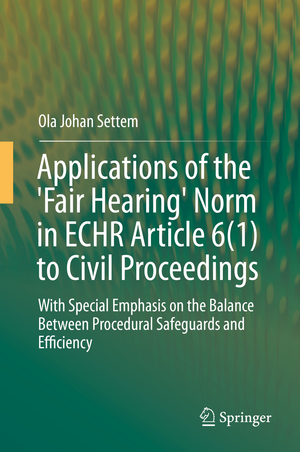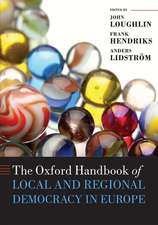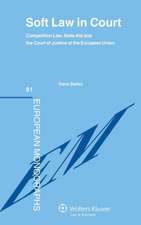Applications of the 'Fair Hearing' Norm in ECHR Article 6(1) to Civil Proceedings: With Special Emphasis on the Balance Between Procedural Safeguards and Efficiency
Autor Ola Johan Settemen Limba Engleză Hardback – 7 dec 2015
The book investigates several important questions of general scope in the context of ECHR Article 6, such as: What is the relevance of case law regarding criminal proceedings when the "fair hearing" right is applied to civil proceedings? How does the Strasbourg Court actually proceed when evaluating whether specific court proceedings have been "fair"? What are the roles of fundamental concepts such as the "margin of appreciation" and proportionality in this regard?
In the subsequent discussion of specific procedural issues, the focus is on the balance that must be struck between procedural safeguards and the objectives of efficiency and economy. The book considers specific procedural issues such as: When must an oral hearing be held in order for civil proceedings to be "fair"? When will a refusal of specific evidence render civil proceedings unfair? When is a civil litigant entitled to le
gal aid? As such, the book not only presents current case law; it also compares various strands of the case law regarding the "fair hearing" right, and argues that the Strasbourg Court's approach to various pertinent issues needs to become more consistent.
Offering an in-depth examination of the Strasbourg Court's case law regarding ECHR Article 6, this book should be consulted by anyone interested in fundamental fair trial rights.
| Toate formatele și edițiile | Preț | Express |
|---|---|---|
| Paperback (1) | 1391.67 lei 6-8 săpt. | |
| Springer International Publishing – 27 mar 2019 | 1391.67 lei 6-8 săpt. | |
| Hardback (1) | 1398.00 lei 6-8 săpt. | |
| Springer International Publishing – 7 dec 2015 | 1398.00 lei 6-8 săpt. |
Preț: 1398.00 lei
Preț vechi: 1704.87 lei
-18% Nou
Puncte Express: 2097
Preț estimativ în valută:
267.52€ • 286.06$ • 223.04£
267.52€ • 286.06$ • 223.04£
Carte tipărită la comandă
Livrare economică 17 aprilie-01 mai
Preluare comenzi: 021 569.72.76
Specificații
ISBN-13: 9783319248813
ISBN-10: 3319248812
Pagini: 518
Ilustrații: XXII, 518 p.
Dimensiuni: 155 x 235 x 38 mm
Greutate: 0.93 kg
Ediția:1st ed. 2016
Editura: Springer International Publishing
Colecția Springer
Locul publicării:Cham, Switzerland
ISBN-10: 3319248812
Pagini: 518
Ilustrații: XXII, 518 p.
Dimensiuni: 155 x 235 x 38 mm
Greutate: 0.93 kg
Ediția:1st ed. 2016
Editura: Springer International Publishing
Colecția Springer
Locul publicării:Cham, Switzerland
Public țintă
ResearchCuprins
1. Introduction.- 2. Historical and Comparative Perspectives.- 3. Methodological Issues.- 4. The Various Components of ECHR Article 6(1).- 5. Fundamental Aspects of the ‘Fair Hearing’ Right.- 6. The ‘Response’ Issue.- 7. The ‘Oral Hearing’ Issue.- 8. The ‘Personal Participation’ Issue.- 9. The ‘Evidence’ Issue.- 10. The ‘Legal Aid’ Issue.- 11. Conclusion.
Textul de pe ultima copertă
This book focuses on the most important implications of the "fair hearing" right for conducting civil proceedings. It provides a thorough and critical analysis of the case law of the European Court of Human Rights (the Strasbourg Court) regarding Article 6 of the European Convention on Human Rights. It puts forward a generally applicable framework for the analysis of the various procedural issues to which the "fair hearing" right may give rise, then applies that framework to discuss a selection of specific procedural issues.
The book investigates several important questions of general scope in the context of ECHR Article 6, such as: What is the relevance of case law regarding criminal proceedings when the "fair hearing" right is applied to civil proceedings? How does the Strasbourg Court actually proceed when evaluating whether specific court proceedings have been "fair"? What are the roles of fundamental concepts such as the "margin of appreciation" and proportionality in this regard?
In the subsequent discussion of specific procedural issues, the focus is on the balance that must be struck between procedural safeguards and the objectives of efficiency and economy. The book considers specific procedural issues such as: When must an oral hearing be held in order for civil proceedings to be "fair"? When will a refusal of specific evidence render civil proceedings unfair? When is a civil litigant entitled to l
egal aid? As such, the book not only presents current case law; it also compares various strands of the case law regarding the "fair hearing" right, and argues that the Strasbourg Court's approach to various pertinent issues needs to become more consistent.
Offering an in-depth examination of the Strasbourg Court's case law regarding ECHR Article 6, this book should be consulted by anyone interested in fundamental fair trial rights.
The book investigates several important questions of general scope in the context of ECHR Article 6, such as: What is the relevance of case law regarding criminal proceedings when the "fair hearing" right is applied to civil proceedings? How does the Strasbourg Court actually proceed when evaluating whether specific court proceedings have been "fair"? What are the roles of fundamental concepts such as the "margin of appreciation" and proportionality in this regard?
In the subsequent discussion of specific procedural issues, the focus is on the balance that must be struck between procedural safeguards and the objectives of efficiency and economy. The book considers specific procedural issues such as: When must an oral hearing be held in order for civil proceedings to be "fair"? When will a refusal of specific evidence render civil proceedings unfair? When is a civil litigant entitled to l
egal aid? As such, the book not only presents current case law; it also compares various strands of the case law regarding the "fair hearing" right, and argues that the Strasbourg Court's approach to various pertinent issues needs to become more consistent.
Offering an in-depth examination of the Strasbourg Court's case law regarding ECHR Article 6, this book should be consulted by anyone interested in fundamental fair trial rights.
Caracteristici
Provides a critical analysis of the case law of the European Court of Human Rights Makes a vast and complex material easily accessible Establishes a theoretical framework for the analysis of the vast number of judgements concerning the fair hearing right in civil proceedings














